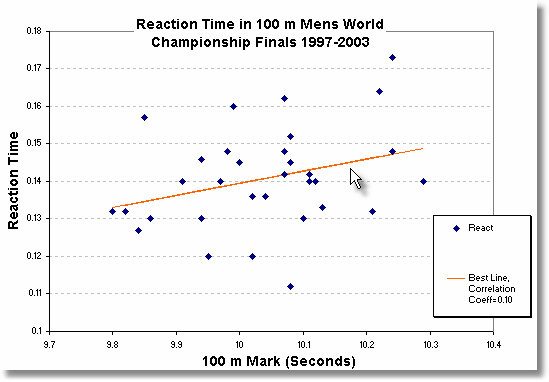Wow, is that true, if so then you would need to add about a tenth of a second to all the Pro times to make them in line with T&F times, so the times wouldn't be nearly as impressive. The times would be good for relative times, I assume we can say Marshall was the fastest one there.
So how about the high school coach without help that wants to be at the finish line and uses the sound of the gun, it would take a tenth of a second for the sound to get to him so the times would be that much faster? Don't bet that it has never happened.
More than you could ever want to know about reaction times...
False start detection:
Since the ‘70s, false starts in major meets have been determined electronically, with ever more sophisticated sensors, and based on research showing that no human can react in less than a tenth of a second. So if the timing shows that a runner begins moving out of the blocks in less than one-tenth of a second, the runner is charged with a false start. This aspect of the false start rule caused a major disruption at the 2003 World Championships.
Jon Drummond was charged with false-starting in a 100-meter quarterfinal after the sensors showed that he reacted in about six-one hundredths of a second.
Because a false start had already been charged to the field, he was disqualified. Drummond argued with officials, then staged a sit-in, lying down on the track, repeating “I didn’t move” to anyone who’d listen. Despite the electronic evidence, he may have had a point;
to the naked eye (look for Drummond in Lane 4 of the video) he doesn’t even appear to be the first off the starting line. Indeed, the crowd, after initially jeering as Drummond delayed the race, began cheering him when the replay was shown on the stadium’s screen. In the end, Drummond and Asafa Powell – who also moved in less than a tenth of a second – were disqualified. Coincidentally, it was Bolden who won the heat, but not before Drummond’s protest had delayed the race by about 50 minutes.
Below is the reaction time data for everyone in that heat.
Best Reaction Times
The best athletes reaction times are usually in the range of 120 mSec (0.12 sec) to 160 mSec (see graphs below). Tim Montgomery improved that to a near perfect 104 mSec - and came very very close to being false-started. The only sprinter to get closer to perfection was Surin Bruny - who managed a 101 mSec in a the 1999 WC 2nd semi-final .
Burrell's 1991 world record began with a reaction time of just 117 mSec. In the same race, Carl Lewis reacted in a snail's-pace 166 mSec, probably because he'd deliberately slowed his start due to having an earlier false-start posted against him (this put him at risk of disqualification if he false-started again). Taking away reaction time, Burrell covered the 100 metres in 9.783 seconds, Lewis in 9.764. Lewis was actually the faster runner, but Burrell was the better "gunner".
In Rome (1987) Carl Lewis' reaction time was 193 mSec for a 9.93 sec run. By Seoul 1988, it was 136 mSec for his 9.92 sec run against Ben Johnsons' 9.79 (Johnson was disqualified for drug positive test), in Tokyo (1991) it was 140 mSec for his World Record 9.86 run. Lewis's 1991 run was 70 mS faster than his 1987 result, and 50 mSec of that improvement was the reduction in start reaction time (source data:
Biomechanics and Movement Science listserver discussion response by J R Mereika or see alsoMereika's page
10 metre split data - Men's 100m); the other 20 mSec could have been wind or other climatic factors!



